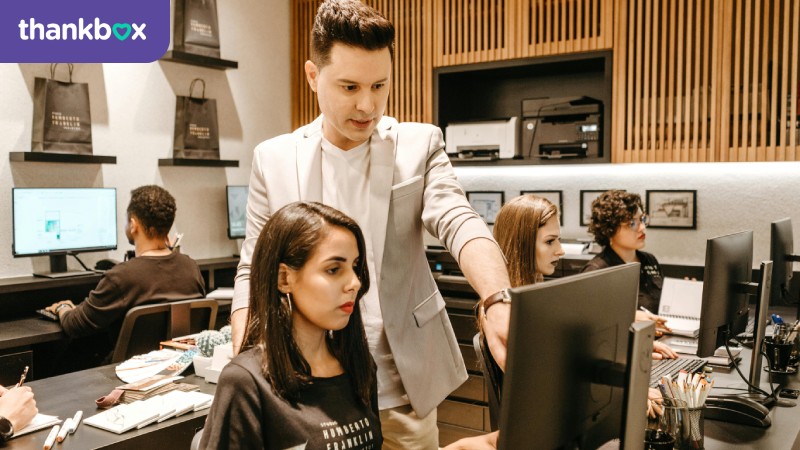What Makes a Good Supervisor? Traits & Leadership Tips


Think back to the best supervisor you’ve ever had. What made them stand out? Maybe they knew how to bring out the best in their team, made even the toughest tasks feel manageable, or always had a way of making people feel valued. Now, think about the worst supervisor you’ve encountered—chances are, they lacked communication, didn’t offer support, or left you feeling like just another cog in the machine.
Supervisors hold a unique position in any organisation. They bridge the gap between leadership and employees, influencing everything from team morale to productivity, retention, and workplace culture. A great supervisor doesn’t just manage tasks—they empower their team to succeed.
But what actually makes a good supervisor? You’re in the right place because in this Thankbox guide, we’re going to share the answers with you! Let’s dive in.
Why is good supervision valuable in the workplace?
A strong supervisor doesn’t just make work easier—they make it better. Here’s why great leadership is essential to a thriving workplace:
Boosts Productivity – Clear goals, fair delegation, and the right level of autonomy help teams work efficiently and effectively.
Increases Employee Engagement – When employees feel supported and recognised, they’re more invested in their work.
Reduces Turnover – People don’t leave jobs, they leave bad managers. A good manager builds trust, making employees more likely to stay.
Encourages Growth and Development – A strong leader mentors and supports their team, helping employees build new skills and advance in their careers.
Creates a Positive Workplace Culture – A supervisor sets the tone for the team. Great leadership fosters collaboration, motivation, and mutual respect.

In essence, good supervision is what keeps teams running smoothly and working well together. When supervisors do a great job, the positive impact can be felt across the whole organisation.
What makes a good supervisor?
A great supervisor isn’t just someone with a fancy title—they are the driving force behind a motivated, high-performing team. They set the tone for workplace culture, help employees navigate challenges, and create an environment where people feel valued and empowered.
Let’s take a look at the key traits that define strong leadership, along with examples of how they make a difference:
1. Clear and open communication
Why it matters: Employees should never be left guessing about expectations, goals, or feedback. A great supervisor ensures everyone is on the same page, reducing confusion and increasing efficiency.
Example: Instead of sending vague emails like “Let’s discuss later,” an effective supervisor says, “Let’s meet at 2 PM to go over your project progress. Bring any questions you have.” Clear communication eliminates uncertainty and builds trust.
2. Empathy and emotional intelligence
Why it matters: A great supervisor doesn’t just focus on results—they understand and support their employees as individuals. By recognising emotions, challenges, and needs, they create a team that feels heard and respected.
Example: An employee is struggling with deadlines due to personal stress. A good supervisor doesn’t just demand faster results—they check in, offer flexible solutions, and show that they genuinely care. Employees who feel supported are more engaged and loyal.
Good supervisors uplift, inspire, and support their teams. Show your appreciation with Thankbox—a simple way to celebrate their leadership, recognise their impact, and boost team morale. A heartfelt message goes a long way. Create a Thankbox today and make their day!
3. Adaptability
Why it matters: No two days—or employees—are the same. A strong supervisor knows when to adjust their approach, whether it’s changing management styles, accommodating new work structures, or responding to unforeseen challenges.
Example: When a team shifts to hybrid work, an adaptable supervisor ensures clear remote communication, adjusts workflows, and supports employees in finding a balance that works for them. Adaptability keeps teams moving forward, even in changing environments.
4. Accountability and integrity
Why it matters: A great supervisor leads by example, taking responsibility for their own actions and holding themselves to the same standards as their team. They create a culture where transparency, fairness, and honesty thrive.
Example: If a mistake is made on a project, a strong supervisor doesn’t shift blame—they acknowledge the issue, work with the team to fix it, and ensure lessons are learned. When supervisors hold themselves accountable, employees feel safer doing the same.
5. Ability to motivate and inspire
Why it matters: Employees perform at their best when they feel encouraged, appreciated, and driven to succeed. A strong supervisor recognises strengths, celebrates achievements, and keeps motivation high.

Example: Instead of only offering feedback when something goes wrong, a great supervisor consistently acknowledges wins—big or small. Whether it’s a simple “Great job on that report!” or a team-wide celebration using Thankbox, recognition fuels motivation.
6. Strong decision-making skills
Why it matters: A supervisor who hesitates or frequently changes direction can create uncertainty and frustration within a team. Great supervisors make informed decisions with confidence, clarity, and fairness.
Example: If a project is falling behind, a good supervisor quickly assesses the situation, consults the team, and makes adjustments rather than waiting for problems to escalate. Decisive leadership keeps teams focused and productive.
7. Conflict resolution skills
Why it matters: Disagreements are inevitable in any workplace, but how they’re handled can either strengthen or damage a team. A great supervisor helps resolve issues fairly and professionally, preventing negativity from spreading.
Example: Two team members disagree on how to approach a project. A strong supervisor doesn’t take sides—they actively listen to both perspectives, mediate a constructive conversation, and find a solution that works for everyone.
8. Ability to encourage collaboration
Why it matters: The best supervisors know that team success is a group effort. They encourage collaboration, trust, and knowledge sharing, making work more enjoyable and productive.

Example: Instead of assigning tasks in isolation, a great supervisor creates opportunities for team brainstorming, cross-department projects, and peer mentorship. Employees who collaborate feel more engaged and connected.
9. Commitment to employee growth and development
Why it matters: A good supervisor doesn’t just focus on daily tasks—they help employees develop their skills and grow in their careers. When employees feel invested in, they’re more likely to stay motivated and loyal.
Example: A supervisor notices an employee has a talent for leadership. Instead of keeping them in the same role, they offer mentorship, assign stretch projects, and encourage professional development opportunities. Investing in employees creates a stronger, more capable team.
10. Recognition and appreciation
Why it matters: People don’t just work for a paycheck—they want to feel valued and appreciated. A great supervisor makes recognition part of the team culture, reinforcing positive behaviors and boosting morale.
Example: Instead of waiting for annual performance reviews, an effective supervisor regularly acknowledges great work through shoutouts, small rewards, or peer-to-peer recognition.

Fortunately, you can take advantage of Thankbox to express your gratitude in the most personalised and sustainable way. You can create the perfect e-card filled with encouraging messages, entertaining GIFs, photos, and videos that everyone can contribute.
You can also use Thankbox to make celebrations memorable. Easily collect money from your teammates to offer a bouquet of flowers or a thoughtful gift card to a deserving team member who may be celebrating an anniversary, engagement or new home. The best part is our gift cards have direct connections to 1000+ retailers (as well as the option to redeem the cash as a Prepaid Visa), so the recipient will truly feel special.
Good supervisors uplift, inspire, and support their teams. Show your appreciation with Thankbox—a simple way to celebrate their leadership, recognise their impact, and boost team morale. A heartfelt message goes a long way. Create a Thankbox today and make their day!
Wrapping up
Being a great supervisor isn’t about micromanaging—it’s about leading with trust, encouragement, and support. When employees feel heard, valued, and recognised, they perform better, collaborate more effectively, and contribute to a stronger workplace culture.
Recognition plays a big role in leadership success. Thankbox makes it easy to create meaningful moments of appreciation, helping supervisors strengthen relationships and keep motivation high.
Ready to celebrate great leadership? Start a Thankbox today and build a culture where employees and supervisors thrive together.
Images: Cover | Meeting | People cheering wine glasses | Outside office





